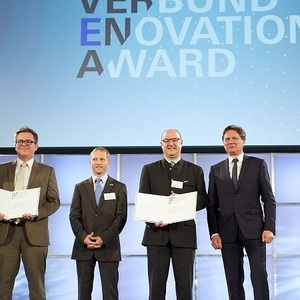Austrian biodiesel technology provider wins award for BTL process

Photo: Ministry of Science, Research and Corporate/APA-Photo Service
April 5, 2016
BY Ron Kotrba
BDI-BioEnergy International AG received an innovation award for its biomass-to-liquid technology, called BioCrack, March 29 during Austria’s State Awards Innovation 2016 ceremony held by the Federal Ministry for Science, Research and Industry. BDI was awarded the prestigious VERENA award, which is an acronym for Verbund E-Novation Award. Verbund AG is Austria’s leading electrical company and sponsor of this particular award.
“As the leading electricity company in Austria, we make every effort to dynamize the efficiency and greening of the energy system,” said Verbund CEO Wolfgang Anzengruber, who presented the award to Edgar Ahn, a member of BDI’s management board. “The VERENA Prize also sets 2016 clear signs of a promising future and energy-efficient mobility solutions. In the awareness that our future cannot unconditionally be dependent on a steady increase in consumption of fossil fuels, we have for many years E-mobility projects, which increase efficiency and protect the environment. All projects are excellent innovations … for future energy supply.”
With its BioCrack process, BDI was honored with the award out of more than 300 nationwide submissions.
Advertisement
The technology was developed through years of research in cooperation with the OMV Schwechat Refinery and the Technical University in Graz. The process incorporates solid biomass with a high-boiling-point byproduct of crude oil refining to produce a diesel fuel with more than 10 percent renewable content. The fuel meets the European diesel fuel quality standards and can be used in diesel engines without modification.
“We are very pleased that with our BioCrack process we have succeeded to develop a simple, cost-efficient BTL technology, which verifiably allows greenhouse gas reductions of more than 80 percent by only using feedstock that does not conflict with the food industry,” Ahn said. “We have successfully completed the pilot stage and are now looking internationally for a suitable strategic partner for a technology application—mainly for the construction of a demonstration plant.”
Advertisement
Related Stories
Keolis Commuter Services, the Massachusetts Bay Transportation Authority’s operations and maintenance partner for the Commuter Rail, has launched an alternative fuel pilot utilizing renewable diesel for some locomotives.
Virgin Australia and Boeing on May 22 released a report by Pollination on the challenges and opportunities of an International Book and Claim system for sustainable aviation fuel (SAF) accounting.
Chevron U.S.A. Inc. on May 15 filed a notice with the Iowa Workforce Development announcing plans to layoff 70 employees at its Ames, Iowa, location by June 18. The company’s Chevron REG subsidiary is headquartered in Ames.
Luxury North Dakota FBO, Overland Aviation—together with leading independent fuel supplier, Avfuel Corp.— on May 19 announced it accepted a 8,000-gallon delivery of sustainable aviation fuel (SAF) on May 12.
May 21 marks the official launch of the American Alliance for Biomanufacturing (AAB), a new coalition of industry leaders committed to advancing U.S. leadership in biomanufacturing innovation, competitiveness, and resilience.
Upcoming Events










